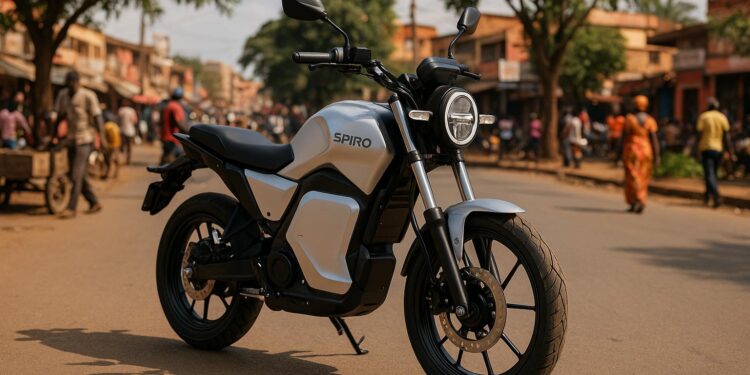Spiro is accelerating Uganda‘s shift toward electric transportation with a $63 million investment. This funding supports the expansion of its battery swapping network, which has grown from 22 stations in mid-2024 to 105 stations today, with plans to expand beyond Kampala into key cities like Jinja, Gulu, and Mbale. The initiative focuses on replacing gas-powered motorcycles – major contributors to air pollution – with electric alternatives powered by Uganda’s renewable energy grid.
Key Points:
- Investment Purpose: Build more battery swapping and fast-charging stations across Uganda.
- Current Network: 105 stations, including 65 in Greater Kampala.
- Planned Expansion: New stations in cities like Masaka, Fort Portal, and Lira.
- Economic Impact: Job creation in manufacturing, assembly, and maintenance sectors.
- Environmental Impact: Reduced emissions and improved air quality in urban areas.
Spiro also aims to make electric bikes accessible by partnering with local banks for financing options, ensuring a smoother transition to clean mobility for riders and businesses.
From Petrol to Electric | Museveni commissions Spiro Electric motorbikes @Kyankwanzi

How Spiro Will Use the $63 Million Investment
Spiro plans to channel its $63 million investment into expanding Uganda’s battery swapping network. This funding marks a major step in upgrading the country’s electric mobility infrastructure.
Infrastructure Development
Since its launch in June 2024 with just 22 stations, Spiro has grown its network to 105 battery swap stations across Uganda, with 65 of those located in Greater Kampala – placing a station approximately every 1.9 miles. This network helps reduce downtime and alleviates range anxiety for riders.
"As we continue to roll out battery stations, we will deploy fast battery stations to complement our swapping network." – Burman Kaushik, Chief Executive Director, Spiro
The investment will help Spiro expand beyond Greater Kampala, with plans to establish new stations in areas such as Wakisin, Mukono, Jinja, Mbarara, Masaka, Fort Portal, Gulu, Lira, Iganga, and Mbale. A notable achievement came in December 2024 when Spiro, in partnership with the Energy Ministry, opened the first battery-swapping station in Kampala’s central business district.
"We will install electric bike swapping and fast charging stations at every planned location." – Eng. Simon Kalanzi, Energy Efficiency and Conservation Commissioner, Energy Ministry
Technology and Transportation Benefits
Spiro’s electric bikes bring a fresh approach to urban mobility, offering a smart alternative to traditional gas-powered motorcycles. At the heart of this innovation is their battery swapping system, which sets them apart.
Battery Swapping Technology
With Spiro’s battery swapping system, riders can replace an empty battery with a fully charged one in no time. This eliminates long charging waits and ensures riders always have access to power, reducing the stress of running out of charge mid-ride. The system is particularly useful for motorcycle taxi operators, as it keeps downtime to a minimum and maximizes productivity. On top of that, these bikes offer not just operational efficiency but also savings and environmental perks compared to gas-powered alternatives.
Electric vs. Gas Motorcycles
Electric bikes stand out for their lower running costs. They require less energy to operate and almost no maintenance – no oil changes or filter replacements to worry about. Plus, they run quietly and produce zero emissions, making them a cleaner option for cities.
Spiro’s electric bikes are well-positioned to transform urban transportation in Uganda, offering a practical and eco-friendly way to navigate busy streets while addressing the challenges of traditional motorcycles.
sbb-itb-7bab64a
Impact on Uganda‘s Economy and Environment
Spiro’s expansion is set to bring a wave of economic growth and cleaner air to Uganda by promoting greener transportation options.
Economic Benefits
This initiative is expected to generate jobs across manufacturing, assembly, and maintenance sectors. It will also encourage workforce training and strengthen local supply chains, creating a ripple effect of economic opportunities. These developments come hand in hand with positive environmental changes.
Impact on Air Quality
Electric bikes are poised to significantly improve urban air quality. Unlike traditional motorcycles, they produce no tailpipe emissions, cutting down on harmful pollutants like carbon monoxide, nitrogen oxides, and particulate matter. This shift not only makes city air healthier to breathe but also reduces fuel consumption, supporting public health and energy conservation efforts.
Spiro’s efforts align with Uganda’s goals for greener transportation, offering clear economic gains and environmental improvements. This approach underscores Spiro’s commitment to reshaping Uganda’s transportation future.
Future Plans for Spiro in Uganda
Spiro has its sights set on reshaping Uganda’s transportation network by promoting greener and more sustainable mobility solutions. With a clear focus on long-term progress, the company is working on initiatives that aim to make eco-friendly transport a practical choice for everyone.
Market Adoption Plans
To make electric transport more accessible, Spiro plans to team up with local financial institutions to offer flexible financing options and incentives. These programs are designed to encourage everyday commuters to make the switch from gas-powered vehicles to electric alternatives.
Long-Term Goals
Spiro’s future plans include expanding its network of charging stations and battery exchange facilities, addressing concerns about range and ensuring vehicles stay on the road longer. The company also intends to diversify its electric vehicle lineup and introduce technical training programs to support a thriving electric mobility ecosystem in Uganda. These efforts will not only enhance the local transportation landscape but also prepare Spiro for potential growth into other East African markets.
Conclusion
Spiro’s $63 million investment marks a significant moment for Uganda’s transportation sector, reflecting a strong belief in the country’s potential to lead the way in clean mobility across the region. This funding supports the development of an ecosystem designed to address key challenges in electric vehicle adoption, focusing on infrastructure growth, local manufacturing, and accessible battery-swapping technology.
The impact of this approach goes beyond transportation – it brings both economic and environmental benefits. On the economic side, it creates jobs in manufacturing and technical services, boosting local industries. Environmentally, the transition from gas-powered motorcycles to electric ones reduces fuel consumption and cuts down on harmful emissions. This is especially critical for urban centers like Kampala, where motorcycles are a major source of air pollution.
Spiro’s partnerships with local financial institutions and technical training programs highlight its dedication to building a sustainable mobility framework. By enhancing local expertise and providing flexible financing options, these collaborations pave the way for long-term success. As Spiro continues to expand its charging network and introduce new electric vehicle models, Uganda is setting a strong example for clean transportation solutions across East Africa.
FAQs
How does Spiro’s battery swapping system work, and what makes it better than traditional charging?
Spiro’s battery swapping system offers riders a quick and hassle-free way to replace a drained battery. At designated swapping stations, users can exchange their used battery for a fully charged one in just seconds. These automated stations are designed to reduce wait times, eliminating the long charging periods that typically range from 20 to 30 minutes or more.
This system comes with several benefits. It ensures faster turnaround times, boosts rider efficiency, and helps extend battery life by recharging batteries under optimal conditions at the stations. Plus, it’s built to support growth and can incorporate renewable energy sources, promoting a greener and more sustainable transportation network.
How will Spiro’s $63 million investment in electric bikes benefit Uganda economically and environmentally?
Spiro’s $63 million investment to expand its electric bike network in Uganda brings a host of promising changes. On the economic front, it’s expected to lower transportation costs for riders while generating over 600 new jobs, boosting local employment. From an environmental perspective, the project aims to significantly reduce emissions of CO2, CO, NOx, and particulate matter. This means cleaner air, less noise pollution, and healthier urban environments. The initiative supports Uganda’s push toward sustainable mobility and a greener economy.
How do Spiro’s partnerships with local banks make electric bikes more accessible for Ugandan riders and businesses?
Spiro’s partnerships with local banks in Uganda are making electric bikes more attainable by introducing low-interest financing options. These options, like affordable loans, allow individuals and businesses – especially in bustling areas like boda boda hubs – to purchase electric bikes with payment plans that fit their budgets.
By lowering the initial cost hurdle, these collaborations promote the use of environmentally friendly transportation, while also contributing to economic opportunities and growth in local communities.
Related Blog Posts
- Top 5 Electric Vehicles Gaining Popularity in Uganda
- Kiira Motors unveils Kayoola electric buses for public transport
- Uganda bans diesel bus imports to boost local manufacturing
- Kampala commuters test new Kayoola EVS e-bus




